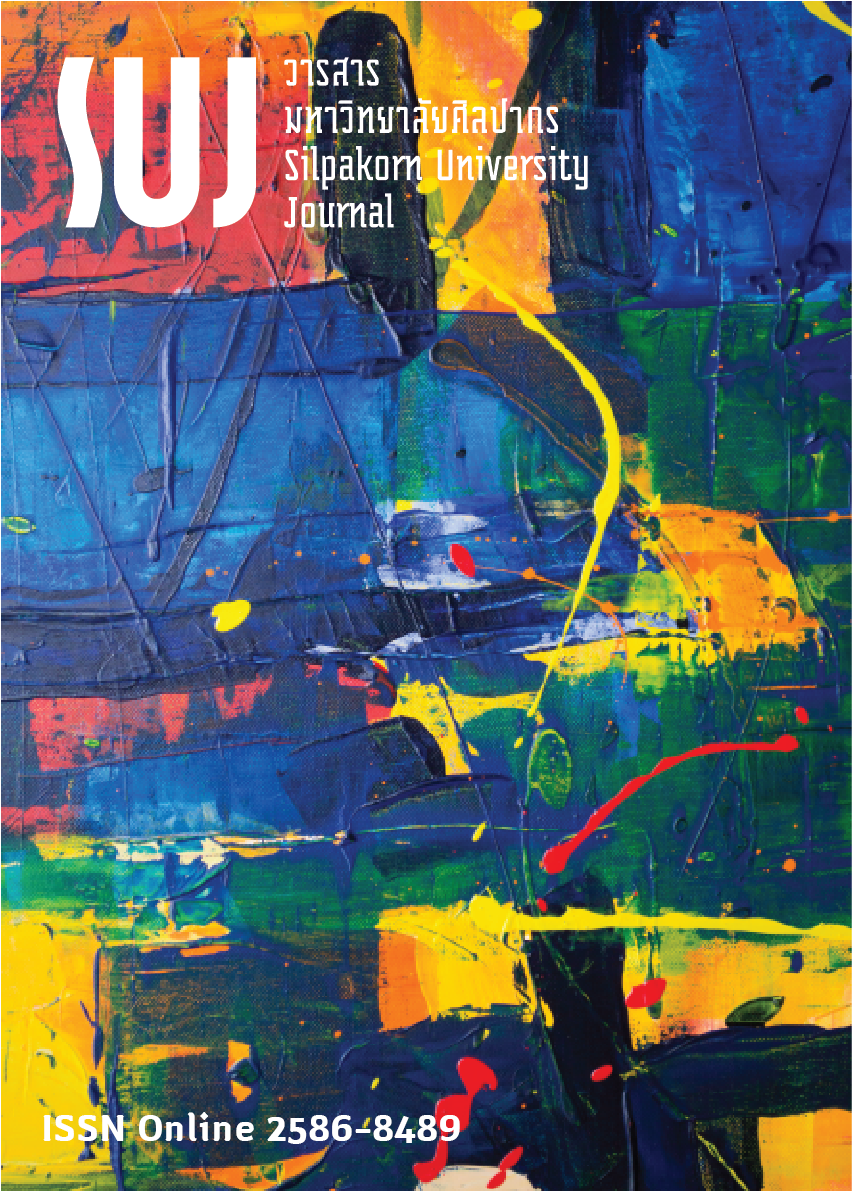การจัดประสบการณ์การเรียนรู้โดยใช้ปรากฏการณ์เป็นฐานสำหรับเด็กปฐมวัย (Phenomenon-Based learning experience provision in young children)
Main Article Content
Abstract
การจัดประสบการณ์การเรียนรู้โดยใช้ปรากฏการณ์เป็นฐานสำหรับเด็กปฐมวัยเป็นการจัดการเรียนรู้ที่บูรณาการองค์ความรู้และทักษะในศาสตร์ต่างๆ ผ่านปรากฏการณ์ตามสภาพจริง เป็นแนวการจัดการเรียนรู้ที่สอดคล้องกับทฤษฎีการสร้างองค์ความรู้ (constructivism) ที่เปิดโอกาสให้เด็กปฐมวัยได้สร้างความรู้และประสบการณ์ต่างๆที่มีความหมายต่อตนเองจากการปฎิสัมพันธ์กับสิ่งแวดล้อมโดยใช้การแสวงหาความรู้ควบคู่กับการลงมือปฏิบัติ ทำให้เด็กมีความเข้าใจต่อสถานการณ์ต่างๆที่เกิดขึ้นเพราะได้เรียนรู้เรื่องราวต่างๆอย่างลุ่มลึก โดยมีครูเป็นผู้จัดโอกาส บรรยากาศ สิ่งแวดล้อม สื่อและแหล่งเรียนรู้ที่เอื้อต่อการเรียนรู้ กล่าวได้ว่า การใช้ปรากฏการณ์เป็นฐานเป็นแนวการจัดประสบการณ์การเรียนรู้ที่เหมาะสมที่จะจัดให้กับเด็กปฐมวัย เพราะธรรมชาติของเด็กปฐมวัยจะสนใจสิ่งต่างๆ รอบตัวชอบซักถามเกี่ยวกับสิ่งแวดล้อมหรือสถานการณ์ที่เด็กได้พบเจอ ชอบทำกิจกรรมที่ท้าทายการคิดและการแก้ปัญหา และต้องการมีส่วนร่วมในการทำกิจกรรมต่างๆ กับผู้อื่น การจัดประสบการณ์การเรียนรู้โดยใช้ปรากฏการณ์เป็นฐานจึงเป็นแนวการจัดการเรียนรู้ที่ส่งเสริมให้เด็กได้พัฒนาทักษะการเรียนรู้ ทักษะการทำงานและทักษะชีวิต โดยเฉพาะอย่างยิ่งทักษะการคิดและการแก้ปัญหาซึ่งเป็นเครื่องมือสำคัญในการจัดการเรียนรู้ในศตวรรษที่ 21 ที่ช่วยเตรียมเด็กปฐมวัยให้สามารถนำประสบการณ์ไปใช้ในชีวิตจริงและสามารถเผชิญกับสถานการณ์ที่ท้าทายในอนาคตได้อย่างดี
Phenomenon-Based Learning (PhenoBL) for young children is an integrated learning provision of both contents of knowledge and skills through authentic phenomena. It aligns with the theory of constructivism that allows young children to construct their own understanding and knowledge of the world, through their interaction with the environment, using knowledge inquiry and hands-on practice. Consequently young children obtain a more insightful understanding of various situations through an in-depth learning process. The teachers’ roles involves facilitating opportunity, atmosphere, learning environment, materials and learning resources. PhenoBL is appropriate approach for early childhood because young children are naturally interested in surroundings and ask many questions about them. They like to do hands-on activities that challenge their thinking and problem solving skills, and they like to participate in activities with others. Consequently, PhenoBL promotes young children’s 21st century skills including learning skills, working skills, life skills, thinking skills, and problem solving skills, all of which are critical for the 21st century learning. In conclusion, PhenoBL prepares young learners to practically apply their experience in their daily life and get ready for any challenging circumstances in the future.
Downloads
Article Details
References
Kilani, A. (2016). What is Phenomenon-Based Learning? [Online]. Retrieved July 6, 2018 from https://teachmiddleeastmag.com/pehomenon-basdes-learning/
Daehler, K. R., & Folsom, J. (2016). Making Sense of SCIENCE: Phenomena-Based Learning. [Online]. Retrieved July 6, 2018 from https://we- mss.weebly.com/uploads/8/6/4/9/8649828/mss_pbl.pdf
Dougherty, K. (2015). Global Trends in Project Based Learning: From the UK, to Finland and Beyond! Education Insider. [Online]. Retrieved July 6, 2018 from https://blog.iat.com/2015/06/26/ new-global-trends-in-project-based-learning/
Kompa, J. S. (2017). Remembering Prof. Howard Barrows: Notes on Problem-Based Learning and the School of the Future. [Online]. Retrieved July 6, 2018 from https://joanakompa.com/ tag/phenomenon-based-learning/
Matichon online. (2018). Luang Nang Non cave is not safe in rainy season (รู้จัก ถ้ำหลวง-ถ้ำขุนน้ำนางนอน ถ้ำที่ไม่ปลอดภัยเมื่อเริ่มเข้าสู่ฤดูฝน). [Online]. Retrieved July 7, 2018 from https://www.matichon.co.th/social/news_1013087
Pfeifer, K. (2017). What’s Finland’s Phenomenon-Based Learning Could Mean for Schools? Good News for Finland. [Online]. Retrieved July 5, 2018 from https://www.goodnewsfinland.com/opinion/finland-s-phenomenon-based-learning-mean-us-schools/
Rahaan, B. D. (2016). Addressing the Disconnect. The Statesman. [Online]. Retrieved November 4, 2018 from https://www.thestatesman.com/supplements/campus/addressing-the-disconnect-1482186094.html
Silander, P. (2015). Phenomenon-Based Learning. [Online] Retrieved July 5, 2018 from https://www.phenomenaleducation.info/phenomenon-based-learning.html
Spiller, P. (2017). Could Subjects Soon Be a Thing of the Past in Finland? BBC News. [Online]. Retrieved July 5, 2018 from: https://www.bbc.com/news/world-europe-39889523
Symeonidis, V., & Schwarz, J.F. (2016). Phenomenon-Based Teaching and Learning Through the Pedagogical Lenses of Phenomenology: The Recent Curriculum Reform in Finland. Forum Oswiatowe, 28(2): 31-47.
Thairathonline. (2014). Coach Choi accepted he punished Goi, but did not punch Her (“โค้ชเช” รับลงโทษจริงแต่ไม่ได้ต่อย “น้องก้อย”). [Online]. Retrieved July 7, 2018 from https://www.thairath.co.th/content/437042
Thairathonline. (2017). Turtle, named Omsin, ate coins and waited for the operations (เต่าออมสิน ถ่ายออมาเป็นเหรียญบาท รอพักฟื้นเตรียมผ่าตัด). [Online]. Retrieved July 7, 2018 from https://www.thairath.co.th/content/865560
Valanne, E., Al Dhaheri, R., Kylmalahti, R., & Sandholm-Rangell, H. (2016). Phenomenon Based Learning Implemented in Abu Dhabi School Model. International Journal of Humanities and Social Sciences, 9(3): 1-17.
Zhukov, T. (2015). Phenomenon-Based Learning: What is PBL? [Online]. Retrieved July 4, 2018 from https://www.noodle.com/articles/phenomenon-based-what-is-pbl


